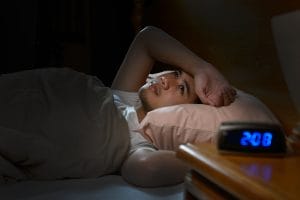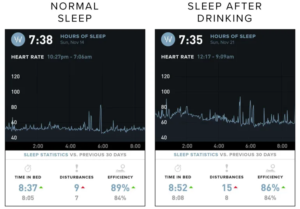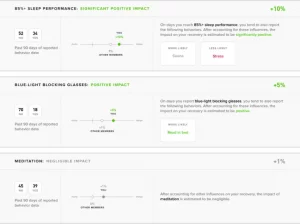Ashleigh Kidd, RD, LDN | November 2023

Welcome to Week 4 Challengers! Congratulations on making it more than half way through the Challenge! As you learn more about your nutrition through the F45 Training App and gain valuable insight on your recovery & sleep habits through your Whoop device, let’s dive in on how the two are connected.
How sleep impacts what we eat:
As it turns out, sleep (or lack thereof) can directly affect our food and nutrition choices. This is because sleep deprivation disrupts our hormones, namely leptin & ghrelin, which regulate our hunger and fullness. As a result, we may feel hungrier than usual, less satisfied after eating, and craving foods higher in sugar. When we’re tired or consistently have disrupted sleep, our hunger/fullness cues aren’t as easy to interpret and we’re more likely to impulsively eat vs. eating mindfully.
How what we eat impacts our sleep:
Likewise, what we eat can also have a significant impact on our quality of sleep. Certain foods and beverages like caffeine and alcohol can disrupt sleep-wake cycles including difficulty falling asleep, and fragmented sleep and wake-ups during the night. Some studies have also shown eating a larger meal (especially higher in fat), or a snack higher in sugar close to bedtime can make it difficult to fall (and stay) asleep.

Determining what is helping/hurting your sleep:
If you’re struggling to fall/stay asleep, or noticing you’re more tired than usual, it can be helpful to keep a food and sleep diary to track your food/beverage intake (including time of day), as well as your sleep patterns. This can help you to identify if any foods/beverages may be interfering with your sleep.
Supporting sleep through nutrition:
- Eat a balanced diet consisting of protein, carbohydrates & fiber, and fat. Including plenty of fruits, vegetables, and wholegrains as these foods contain nutrients such as magnesium, potassium, and vitamin B6 (all essential for good sleep).
- Avoid eating larger meals, meals higher in fat, or snacks higher in sugar right before bed. Instead, choose a balanced snack that includes fiber and protein like an unsweetened Greek yogurt with berries.
- Limit caffeine. Ideally, avoid caffeine in the afternoon and evenings if your sleep is affected.
- Limit/avoid alcohol intake a few hours before bedtime
- Stay hydrated by drinking plenty of water throughout the day
- Consult with your medical provider to see if a magnesium or melatonin supplement is right for you
Other ways to potentially improve your sleep:
- Avoid screen time 2-3 hours before bedtime (turn off the TV/laptop, and stop scrolling… I know it’s easier said than done!)
- If you must have a light on, try using a dim red light
- Turn your bedroom into an oasis (aka a space where you’re comfortable, ideal for sleeping), getting rid of clutter and work-related items.
- Go to bed around the same time every night (choose a time you typically get tired)
- Keep it DARK. Studies have shown, the darker it is, the better you’ll sleep. You can try a sleep mask, black out curtains, and make sure to shut off or cover anything that emits light (i.e. computer monitor).
- WHOOP studies have shown that keeping your sleep environment between 62-68 degrees will quicken the transition from light sleep into a mentally & physically restorative sleep
- For some, exercising too close to bedtime can disrupt sleep. Aim to exercise at the beginning of the day.
- Incorporate a night time meditation
Using your Whoop Journal, you can log your nightly routine and gain insight on how it’s affecting your recovery, and learn which “pre-bed activities” work best for you.
Learn more about tracking with WHOOP here and if you haven’t picked up a WHOOP band yet visit f45training.com/f45-challenge/whoop/.







